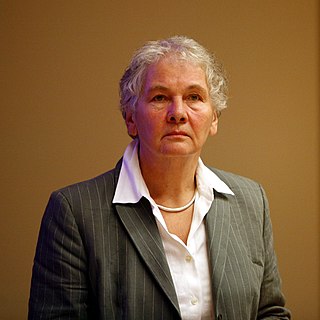A Quote by Audre Lorde
Institutionalized rejection of differences is an absolute necessity in a profit economy which needs outsiders as surplus people. As members of such an economy, we have all been programmed to respond to the human differences between us with fear and loathing and to handle that difference in one of three ways: ignore it, and if that is not possible, copy it if we think it is dominant, or destroy it if we think it is subordinate.
Quote Topics
Related Quotes
For the church is not a human society of people united by their natural affinities but the Body of Christ, in which all members, however different, (and He rejoices in their differences and by no means wishes to iron them out) must share the common life, complementing and helping one another precisely by their differences.
There's going to be biological differences between the genders. There's going to be biological differences between two women or two men. There's biological differences between all of us. My concern is, why are we so concerned about it? Why are we so worried about it? Why, whenever a study comes out about men do this one way and women do this one way, or men's brains and women's brains - why are we so interested in that? You know, what makes us so fascinated by differences between the sexes? And I think more often than not that interest is deeply embedded in sexism.
There are all sorts of institutions in the economic world which depart from the simple price/market model which I worked on in an earlier incarnation and which has been sort of the mainstream of economic theories since Adam Smith and David Ricardo. There are all sorts of contractual relations between firms and individuals which do not conform to the simple price theory - profit-sharing schemes and so forth - and the explanation for these suddenly became clear. We now understand why these emerged and that they are based on differences in information in the economy.
The prevailing tendency to regard all the marked distinctions of human character as innate, and in the main indelible, and to ignore the irresistible proofs that by far the greater part of those differences, whether between individuals, races, or sexes are such as not only might but naturally would be produced by differences in circumstances, is one of the chief hinderances to the rational treatment of great social questions, and one of the greatest stumbling blocks to human improvement.
The fundamental differences between Marxian and traditional orthodox economics are, first, that the orthodox economists accept the capitalist system as part of the eternal order of Nature, while Marx regards it as a passing phase in the transition from the feudal economy of the past to the socialist economy of the future.
Is it not possible to look beyond the canes, the wheelchairs, the braces, and the crutches into the hearts of the people who have need of these aids? They are human beings and want only to be treated as ordinary people. They may appear different, move awkwardly, and speak haltingly, but they have the same feelings. ... They want to be loved for what they are inside, without any prejudice for their impairment. Can there not be more tolerance for differences-differences in capacity, differences in body and in mind?






































